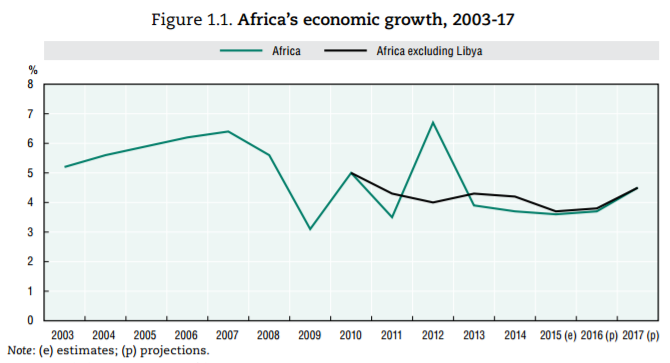
Africa rising?
Why transparency matters in the governance of Africa’s resources
On a continent where natural resources have for so long been associated with poor governance, conflict and corruption, this piece takes a glass half full look at the progress made in governing Africa’s natural resources, and why transparency matters.
Yet, transparency is not an end in itself, it is a means to an end: an end where a true “Africa Rising” begins.
Natural resources: the backbone of the Africa Rising narrative
Since the beginning of the millennium, sustained economic growth across many African countries gave birth to the Africa rising narrative. Though it is arguably a flawed narrative, partly because it's exaggerated and not based on inclusive growth, economic indicators have indeed improved across the continent. The backbone of this growth has been extractive natural resources, mainly oil and minerals.
Yet, with the recent fall in commodity prices and a declining growth rate, among other factors, the sustainability of the Africa rising narrative is again challenged. Are we witnessing the end of a rising Africa?
Not really.

Source: African Economic Outlook 2016
African countries are beginning to pick up again. The continent still hosts sizeable resource wealth and reserves. On a continent where such resources have for so long been associated with poor governance, conflict and corruption, this piece takes a glass half full look at the progress made in governing Africa’s natural resources, and why transparency matters.
Lightening up the dark room
The extractive sector has been historically opaque, making resource governance complex-politically, technically. This mixture, spiced with other factors, has brewed a system that has caused the continent millions through illicit financial flows. In 2015 alone, more money vanished illegally out of Africa (USD 203 billion) than money that came in as aid, loans and remittances (USD 163 billion) according to a recent report by Global Justice Now and partners. To improve transparency and good governance and overcome the complexities, the Extractive Industries Transparency Initiative (EITI), like other local and global partners, is contributing.
The EITI- a widely implemented multi-stakeholder governance tool, has evolved from a revenue transparency initiative to a wider effort aimed at improving governance across the extractive sector value chain. When the EITI was initially conceived, African countries formed about half of the pioneering members. As of today, African countries make up almost 50% of EITI implementing countries.
Using the EITI Standard as a tool, 25 African countries now report to its citizens how much money extractive companies pay to governments and how much revenue governments receives from extractive companies. The reports also sensitise communities about payments made from companies directly to local communities, as well as government revenues distributed to local governments of development.
Extractive industry transparency reportings are increasingly yielding practical impact on the ground. The country-led approach of the EITI has contributed towards the fight against extractive sector corruption and conflict. Here is why.
Lights on, what’s next? Increased efforts toward curbing corruption
In Democratic Republic of the Congo, EITI Reports aided investigations to reveal how a mining company paid USD 160 million royalties of revenue meant for the country to an ‘infamous’ tycoon.
Beside the revelations, efforts have been made to retrieve lost revenues and help reduce corruption across the continent. In Nigeria, the Government claims that information in EITI Reports have led to the recovery of USD 2.4 billion of unpaid revenue and have identified a further USD 7 billion which it expects to recover.
Ghanaian revenue authorities have retrieved monies paid to a company in a mispriced gas processing plant deal, while traditional leaders and citizens are using the EITI Reports to hold their local government accountable for development in the oil-producing communities.
Besides these, African EITI countries are also leading efforts to disclose ‘hidden’ owners behind extractive companies, make oil, gas and mining contracts more transparent, provide space for state-society-company partnership and improve overall public debate in the fight against corruption. These efforts are nurturing transparency and accountability that will incrementally contribute in reducing illicit financial flows.
Oiling the wheels of peace: transparency and conflict prevention
Over the last 60 years, at least 40% of all intrastate conflicts have been linked to high-value extractive resources. African countries have been mostly associated with this curse of natural resources. This is changing as countries are using the EITI as a conflict prevention tool. This is particularly evident in countries where bloody conflicts have been linked to extractive resources.
In Sierra Leone and Liberia, EITI’s tripartite multi-stakeholder governance approach, which brings together representatives from government, companies and civil society, has provided a platform for communities and stakeholders to deliberate on the most contentious issues within the extractive sector, an opportunity that hardly existed before the EITI .
Conscious of the role of corruption, mismanagement and distrust in fuelling the war, the Liberian Extractive Industries Transparency Initiative (LEITI) has made a special effort to make the multi-stakeholder group an inclusive platform for dialogue. This has now created an opportunity to address grievances and diffuse frustrations that could escalate into conflict, thus serving as a conflict-reducing platform that contributes to addressing the roots of Liberia's conflicts.
Beyond Transparency…
The EITI has contributed immensely to extractive sector governance in Africa. During the last decade, there has been an unprecedented level of transparency in the hitherto opaque extractive sector in Africa. Transparency and increasing accountability are helping to improve the governance of natural resources. Improved governance of the continent's natural wealth, in turn, can contribute to sustained growth and development.
Despite these improvements, further progress beyond extractive sector transparency is imperative. Structural transformation and diversification of the economy to shift the focus from resource production to value-added industrialisation will be critical for Africa’s long-term growth. Growth is meaningless if it’s not inclusive. Governments must seek to use resource wealth to invest into its human resources and ensure inclusive growth among citizens, particularly the youth who form a core of Africa’s population.
Transparency is not an end in itself, it is a means to an end: an end where a country’s resource wealth really benefits its people. This end, is where a true “Africa Rising” begins.
Image credit: Still of the video on Africa Rising by the IMF
Related content





